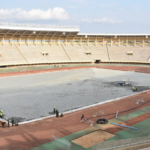Uganda Tourism Board’s Grading and Classification Exercise Enhances Uganda’s Tourism Standards

The Uganda Tourism Board (UTB) has initiated a grading and classification exercise to improve the quality of lodging and dining options for tourists. The first phase includes facilities in several cities and runs until September 4th, 2023. The exercise, carried out every two years, assesses various elements of lodging facilities and has been digitalized for transparency. While the process is optional, it benefits both guests and establishments by setting appropriate prices and enhancing Uganda’s appeal as a tourist destination for international conferences.
According to the Uganda Tourism Board (UTB), the first phase will begin with facilities in Kampala, Jinja, Entebbe, Mbale, Fort Portal, and Mbarara and run until September 4. This was last carried out in 2018.
As Susan Muhwezi (left) listens, Lilly Ajarova, the Chief Executive Officer of the Uganda Tourism Board, speaks about the grading and classification exercise.
The Tourism Act of 2008, which charges UTB with the duty of upholding standards in the tourism sector, governs how businesses are graded and classified.
“The tourism board is, therefore, responsible for registering, inspecting, licensing, and classifying tourism enterprises,” said UTB executive director Lilly Ajarova at a press conference at the UTB offices in Kampala on Wednesday 2nd August 2023.
“The classification and grading of any accommodation facility can only happen after such a facility has been registered, inspected and licensed.”
The activity complies with the requirement of Article 115 (2) of the East African Treaty, which names tourism as one of the sectors of cooperation between member nations, and Uganda.
The goal is to collaborate to improve the caliber of the lodging and dining options available to tourists in the area. The exercise was officially flagged off by a group of trained East African evaluators.
The chairwoman of the Uganda Hotel Owners Association (UHOA), Suzan Muhwezi, reaffirmed the private sector’s support for the initiative and invited hotels to take part for the benefit of the sector. The activity, according to her, is an essential part of promoting Uganda as a popular tourist destination that upholds high standards for the satisfaction of visitors.
According to international standards, the validation exercise should be performed every two years, according to UTB deputy CEO Bradford Ochieng. He explained that the team of assessors will consider the condition of every element of a certain lodging facility, from kitchens to bathrooms.
In order to establish a transparent monitoring system that would be accessible to everyone from the assessor to the CEO, the system has been digitalized.
According to Ajarova, this should increase the public’s and investors’ confidence that the exercise would be carefully carried out to the needed standards.
Town hotels, resort hotels, lodges, guest homes, tented camps, service apartments, motels, and restaurants are among the facilities that need to be rated and categorised.
The grading and classification effort, according to UHOA Executive Director Jean Byamugisha, will aid in setting the prices a particular facility will charge.
“A client will not be duped into paying prices of, for example, a five-star facility for services of a two-star facility,” she added of the grading and classification process.
She was eager to emphasize that although the exercise is optional, it benefits both guests and lodging establishments.
According to Byamugisha, while deciding which countries would host an international conference, planners consider the availability of various types of accommodations.
“We, therefore, need to know the number of accommodation facilities and their grades before we bid for international conferences to be hosted in Uganda.”







